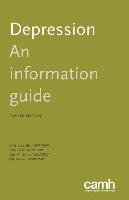This recently updated guide is written for people living with depression, their families, and anyone interested in gaining a basic understanding of this illness and its treatment and management. The guide gives information on: - what depression is and how it is diagnosed - the different kinds of depression - the causes and current theories of depression - the different kinds of treatments available - frequently asked questions and concerns about medication - the process of recovery and effective relapse prevention - how family members can relate to a person with depression - how to explain depression to children. This guide will help people with depression, along with their family and friends, to understand and navigate through the realities of depression, and the options available to them as they move toward recovery.

